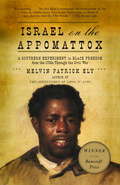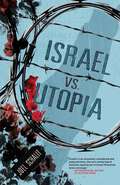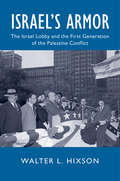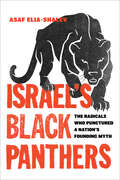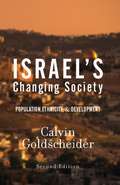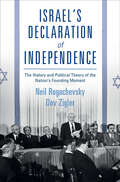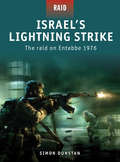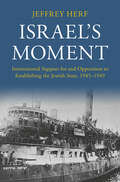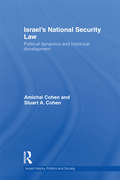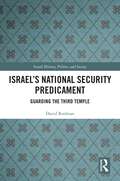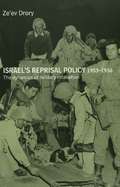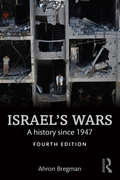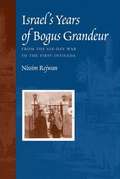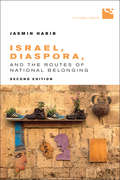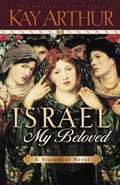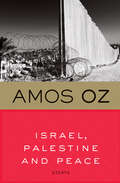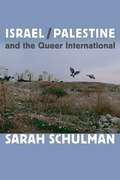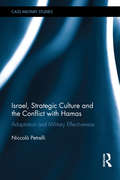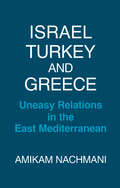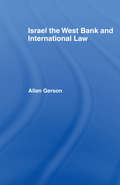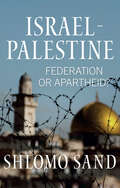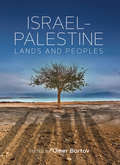- Table View
- List View
Israel on the Appomattox: A Southern Experiment in Black Freedom from the 1790s Through the Civil War
by Melvin Patrick ElyThomas Jefferson condemned slavery but denied that whites and liberated blacks could live together in harmony. Jefferson’s young cousin Richard Randolph and ninety African Americans set out to prove the sage of Monticello wrong. When Randolph died in 1796, he left land for his formidable bondman Hercules White and for dozens of other slaves. Freed, they could build new lives there alongside white neighbors and other blacks who had gained their liberty earlier. Fittingly, the Randolph freedpeople called their promised land Israel Hill. These black Israelites and other free African Americans established farms, plied skilled trades, and navigated the Appomattox River in freight-carrying “batteaux. ” Hercules White’s son Sam and other free blacks bought and sold boats, land, and buildings, and they won the respect of whites. Melvin Patrick Ely captures a series of remarkable personal and public dramas: free black and white people do business with one another, sue each other, work side by side for equal wages, join forces to found a Baptist congregation, move West together, and occasionally settle down as man and wife. Even still-enslaved blacks who face charges of raping or killing whites sometimes find ardent white defenders. Yet slavery’s long shadow darkens this landscape in unpredictable ways. After Nat Turner’s slave revolt, county officials confiscate and auction off free blacks’ weapons–and then vote to give the proceeds to the blacks themselves. One black Israelite marries an enslaved woman and watches, powerless, as a white master carries three of their children off to Missouri; a free black miller has to bid for his own wife at a public auction. Proslavery hawks falsely depict Israel Hill to the nation as a degenerate place whose supposed failure proves blacks are unfit for freedom. The Confederate Army compels free black men to build fortifications far from home, until Lee finally surrenders to Grant a few miles from Israel Hill. Ely tells a moving story of hope and hardship, of black pride and achievement. He shows us an Old South we hardly know, where ties of culture, faith, affection, and economic interest crossed racial barriers–a society in which, ironically, many whites felt secure enough to deal fairly and even cordially with free African Americans partly because slavery still held most blacks firmly in its grip.
Israel vs. Utopia
by Joel SchalitIsraeli American journalist Schalit distinguishes between the Israel he knows and the image of it in the minds of Americans. Israel is a synonym for many things: the ancestral home of the Jewish people, the hell of the Palestinians; the realization of a centuries-old dream of freedom, and the heart of the War on Terror. No country inspires as much debate about its rights and wrongs, its legitimacy and illegitimacies, than Israel. Historically associated with Europe, such debate finally became common in the U.S. during the Bush era, as America deepened its involvement in the region, and Israel fought three wars. In his new book, Israel vs. Utopia, Israeli American journalist Joel Schalit distinguishes between the Israel he knows, and the image of it that exists in the imagination of Americans. Israel is a state of mind, Schalit argues, as much as it is its own sovereign state. Exploring this tension, in America, in Israel, employing a combination of personal observation, political, and cultural commentary, Schalit defines the instability of Israel, as a metaphor, and America’s troubled love for it, as only an Israeli American would know.
Israel's Armor: The Israel Lobby and the First Generation of the Palestine Conflict (Cambridge Studies in US Foreign Relations)
by Walter L. HixsonThe United States and Israel have long had a 'special relationship'. The US became the first country in the world to recognize the state of Israel in 1948, and has been an important ally and benefactor ever since. A critical component of the special relationship is the pro-Israel lobby. Although the lobby has been a controversial topic in public affairs, it has been widely understudied. Israel's Armor fills a gap in the existing literature by examining the origins and early history of the Israel lobby, looking at its influence on American foreign policy, and weaving its activities into the diplomatic history of the first generation of the Palestine conflict. Covering the period roughly from World War II to the pivotal June War, 1967, Walter L. Hixson demonstrates that the Israel lobby from the outset played a crucial role in mobilizing US support for the Zionist state.
Israel's Black Panthers: The Radicals Who Punctured a Nation's Founding Myth
by Asaf Elia-ShalevThe powerful story of an activist movement that challenged the racial inequities of Israel. Israel's Black Panthers tells the story of the young and impoverished Moroccan Israeli Jews who challenged their country's political status quo and rebelled against the ethnic hierarchy of Israeli life in the 1970s. Inspired by the American group of the same name, the Black Panthers mounted protests and a yearslong political campaign for the rights of Mizrahim, or Jews of Middle Eastern ancestry. They managed to rattle the country's establishment and change the course of Israel's history through the mass mobilization of a Jewish underclass. This book draws on archival documents and interviews with elderly activists to capture the movement's history and reveal little-known stories from within the group. Asaf Elia-Shalev explores the parallels between the Israeli and American Black Panthers, offering a unique perspective on the global struggle against racism and oppression. In twenty short and captivating chapters, Israel's Black Panthers provides a textured and novel account of the movement and reflects on the role that Mizrahim can play in the future of Israel.
Israel's Changing Society
by Calvin GoldscheiderThis book provides the most up-to-date assessment of Israel's society today, portraying the country's ethnic diversity, its economy, and demographic changes. Revealing linkages between demographic transformation and socioeconomic change, Goldscheider shows how ethnic group formation emerged in Israel to create the present mix of Jewish and Arab populations. He also reviews the policies of Palestinian and Israeli governments concerning immigration, describing the ways in which socioeconomic development within Israel, urbanization, and industrialization have evolved through the use of outside capital and increasing dependency.
Israel's Changing Society
by Calvin GoldscheiderThis book provides the most up-to-date assessment of Israel's society today, portraying the country's ethnic diversity, its economy, and demographic changes. Revealing linkages between demographic transformation and socioeconomic change, Goldscheider shows how ethnic group formation emerged in Israel to create the present mix of Jewish and Arab populations. He also reviews the policies of Palestinian and Israeli governments concerning immigration, describing the ways in which socioeconomic development within Israel, urbanization, and industrialization have evolved through the use of outside capital and increasing dependency.
Israel's Changing Society
by Calvin GoldscheiderThis book provides the most up-to-date assessment of Israel's society today, portraying the country's ethnic diversity, its economy, and demographic changes. Revealing linkages between demographic transformation and socioeconomic change, Goldscheider shows how ethnic group formation emerged in Israel to create the present mix of Jewish and Arab populations. He also reviews the policies of Palestinian and Israeli governments concerning immigration, describing the ways in which socioeconomic development within Israel, urbanization, and industrialization have evolved through the use of outside capital and increasing dependency.
Israel's Declaration of Independence: The History and Political Theory of the Nation's Founding Moment
by Neil Rogachevsky Dov ZiglerIsrael's Declaration of Independence brings to life the debates and decisions at the founding of the state of Israel. Through a presentation of the drafts of Israel's Declaration of Independence in English for the first time, Neil Rogachevsky and Dov Zigler shed new light on the dilemmas of politics, diplomacy, and values faced by Israel's leaders as they charted the path to independence and composed what became modern Israel's most important political text. The stakes began with war, state-building, strategy, and great power politics, and ascended to matters of high principle: freedom, liberty, sovereignty, rights, and religion. Using fast-paced narration of the meetings of Israel's leadership in April and May 1948, this volume tells the astonishing story of the drafting of Israel's Declaration of Independence, enriching and reframing the understanding of Israel's founding and its ideas - and tracing its legacy.
Israel's Lightning Strike - The raid on Entebbe 1976
by Peter Dennis Simon DunstanThe Israeli Special Forces' operation at Entebbe goes down in history as one of the most audacious counter-terrorist assaults ever conducted. On 27 June 1976, four terrorists - two of the Popular Front for the Liberation of Palestine and two of the German Baader-Meinhof terrorist group - highjacked a passenger jet and forced a landing in Entebbe, Uganda. Here they were met by reinforcements, and - although releasing a few hostages - transferred all the Jewish and Israeli prisoners to the terminal building. As Idi Amin's assistance to the terrorists became increasingly clear, the Israeli government began preparations for a military assault. The element of surprise was crucial; never before had such a large-scale raid at such a long distance been successfully undertaken. This is the incredible story of how the Israeli Special Forces defied radar for over 2,000 miles, masqueraded as a tyrant in a Mercedes and captured uniforms, and defeated an army in brutal combat, in a triumph of sheer audacity and nerve. A compelling book chronicling an incredible moment in history.
Israel's Moment: International Support for and Opposition to Establishing the Jewish State, 1945–1949
by Jeffrey HerfIsrael's Moment is a major new account of how a Jewish state came to be forged in the shadow of World War Two and the Holocaust and the onset of the Cold War. Drawing on new research in government, public and private archives, Jeffrey Herf exposes the political realities that underpinned support for and opposition to Zionist aspirations in Palestine. In an unprecedented international account, he explores the role of the United States, the Arab States, the Palestine Arabs, the Zionists, and key European governments from Britain and France to the Soviet Union, Czechoslovakia and Poland. His findings reveal a spectrum of support and opposition that stood in sharp contrast to the political coordinates that emerged during the Cold War, shedding new light on how and why the state of Israel was established in 1948 and challenging conventional associations of left and right, imperialism and anti-imperialism, and racism and anti-racism.
Israel's National Security Law: Political Dynamics and Historical Development (Israeli History, Politics and Society)
by Stuart Cohen Amichai CohenTerror attacks on western civilian targets have stimulated interest in the dilemmas faced by liberal societies when combating threats to national security. Combining the perspectives of political science and law, this book addresses that discourse, asking how democracies seek to harmonize the protection of individual liberties with the defence of state interests. The book focuses on the experience of Israel, a country whose commitment to democratic values has continuously been challenged by multiple threats to national survival. It examines the legal, legislative and institutional methods employed to resolve the dilemmas generated by that situation, and thus provides a unique interpretation of Israeli national security behaviour. Policy-making and policy-implementation in this sphere, it shows, have reflected not just external constraints but also shifts in the domestic balance of power between the executive, the legislature and the judiciary. The book concludes with an agenda of the measures that each branch of government needs to implement in order to repair the flaws that have developed in this system over time. Based on a close reading of legislative and court readings, the book proposes a new taxonomy for the analysis of national security legal frameworks, both in Israel and elsewhere in the democratic world. As such it will be of great interest to students and scholars of political science, national security law, Israeli history and civil-military relations.
Israel's National Security Predicament: Guarding the Third Temple (Israeli History, Politics and Society)
by David RodmanThis book provides a ground-breaking assessment of the Israeli national security experience from the establishment of the country through to the present day. Seventy-five years after its establishment, the State of Israel continues to face an acute national security predicament as a result of the still unresolved Arab–Israeli conflict. This monograph offers a new framework for analyzing this experience, first exploring the crucial events of the past and present that define it, including interstate wars, asymmetrical wars, low-intensity conflicts, and developments in weapons of mass destruction. The book then probes how Israel’s evolving national security doctrine has addressed these various challenges over the years, highlighting the roles of a number of variables: deterrence, warning, and decision; strategic depth and defensible borders; the quality and quantity of fighting men and machines; intelligence; self-reliance in military matters; foreign policy; and the influence of ethnic demography, societal resilience, economic prosperity, and water security. Written in accessible, non-technical language, the book will appeal to general readers seeking an introduction to Israeli security, as well as to specialists and researchers in various fields, including Israeli history, Middle Eastern politics, and security studies.
Israel's Reprisal Policy, 1953-1956: The Dynamics of Military Retaliation (Cass Military Studies)
by Ze'ev DroryFollowing Israel's War of Independence in 1948 and 1949, the anticipated peace did not materialize and the new nation soon found itself embroiled in protracted military conflict with neighbouring Arab states. Demobilization of its armed forces led to the formation of special elite unit under the command of Ariel Sharon to cope with cross-border infiltration, pillage and murder. A policy of deterrence was governed by the tactic of retaliation, which contained the seeds of escalation. At the same time, a military dynamic unfolded in which the logic of field unit response dictated both military and political policy and caught the imagination of a demoralized and war-weary Israeli society.The myth of the Israeli paratroopers at the beginning of the 1950s, and their heroic deeds in the reprisal raids, embodied the new Zionist ethos for which the current Prime Minister of Israel, Ariel Sharon, claims much of the credit. The book thus provides historical insight into some of the most intractable developments of the current Arab-Israeli conflict.
Israel's Wars: A History Since 1947 (Warfare and History)
by Ahron BregmanIsrael's Wars is a fascinating and essential insight into the turbulent history of this troubled country which, since its foundation, has endured almost constant violence. Bringing its coverage up to date with recent conflicts, this fourth edition includes a new chapter on the Gaza wars from 2007-2014, a new preface and an updated concluding chapter. From the 1947-8 Jewish-Palestinian struggle for mastery of the land of Palestine to the Al-Aqsa intifada, the second Lebanon war and the Gaza wars, Bregman exposes hitherto unknown facts, including details of secret Soviet involvement in inciting the 1967 Six Day War, Israeli bombing of the American warship the USS Liberty, and Israeli assassinations of leading Palestinians in the Gaza Strip and the West Bank. Illustrated throughout with maps and photographs, this new edition is valuable reading for students of Arab-Israeli conflicts over the last seventy years.
Israel's Years of Bogus Grandeur: From the Six-Day War to the First Intifada
by Nissim Rejwan foreword by Nancy E. BergOn the eve of the Six-Day War in 1967, Israel was nineteen years old and as much an adolescent as the average nineteen-year-old person. Issues of identity and transition were the talk among Israeli intellectuals, including the writer Nissim Rejwan. Was Israel a Jewish state or a democratic state? And, most frustratingly, who was a Jew? As Nancy Berg's foreword makes clear, these issues became more critical and complex in the two decades after the war as Israel matured into a regional power. Rejwan, an Iraqi-born Jew whose own fate was tied to the answers, addresses the questions of those days in his letters, essays, and remembrances collected in Israel's Years of Bogus Grandeur. Israel's overwhelming victory in 1967 brought control of the former Palestinian territories; at the same time, Oriental Jews (i. e. , those not from Europe) became a majority in the Israeli population. The nation, already surrounded by hostile, recently humiliated Arab neighbors, now had an Arab majority (Jewish, Muslim, Druze, and Christian) within its borders--yet European Jews continued to run the country as their own. Rejwan wrote tirelessly about the second-class status of Arab Israelis (and especially of Arab Jews), encouraging a more inclusive attitude that might eventually help heal the wounds left by the Six-Day War. His studies in sociology at Tel Aviv University informed his work. For his cause, Rejwan lost his job and many of his friends but never his pen. Through Munich, Entebbe, political scandals, economic crises, and the beginning of the Intifada, Rejwan narrates Israel's growing pains with feisty wit and unwavering honesty.
Israel, Diaspora, and the Routes of National Belonging, Second Edition (Cultural Spaces)
by Jasmin HabibOver the course of four years, Jasmin Habib was a participant observer on tours of Israel organized for diaspora Jews as well as at North American community events focusing on Israel and Israel-diaspora relations. In this book, she argues that much of the existing literature about North American Jews and their relationship to Israel ignores their reactions to official narratives and perpetuates an "official silence" surrounding the destructive aspects of nationalist sentiments. The second edition of Israel, Diaspora, and the Routes of National Belonging includes a new introduction by the author that builds on her groundbreaking research and reflects on the changes to scholarship since the book’s publication in 2004. Additionally, by exploring the dramatic changes to the region’s politics, Habib ensures that the startlingly honest, theoretically rich, and detailed analysis of her original work continues to be of relevance over a decade later.
Israel, My Beloved
by Kay ArthurHistory comes alive as Kay begins with the tragic mistakes that led to Israel's captivity by Babylon and takes readers all the way to the modern-day miracles of triumph against all odds. A heartwarming novel filled with adventure and suspense, Israel, My Beloved is an incredible testimony of God's great love and faithfulness even in Israel's darkest hour.
Israel, Palestine and Peace: Essays
by Amos Oz&“Powerful&” essays from a founder of the Peace Now movement and advocate for a two-state solution (Library Journal). The haunting poetry of [Oz's] prose and the stunning logic of his testimony make a potent mixture." —Washington Post Book World Amos Oz was one of the first voices of conscience to advocate for a two-state solution. As a founding member of the Peace Now movement, Oz has spent over thirty-five years speaking out on this issue, and these powerful essays and speeches span an important and formative period for understanding today's tension and crises. Whether he is discoursing on the role of writers in society or recalling his grandmother's death in the context of the language's veracity; examining the Israeli-Palestinian conflict as a tragicomedy or questioning the Zionist dream, Oz remains trenchant and unflinching in this moving portrait of a divided land. "[Oz is] the modern prophet of Israel." —Sunday Telegraph (UK)
Israel, Palestine and the Queer International
by Sarah SchulmanIn this chronicle of political awakening and queer solidarity, the activist and novelist Sarah Schulman describes her dawning consciousness of the Palestinian liberation struggle. Invited to Israel to give the keynote address at an LGBT studies conference at Tel Aviv University, Schulman declines, joining other artists and academics honoring the Palestinian call for an academic and cultural boycott of Israel. Anti-occupation activists in the United States, Canada, Israel, and Palestine come together to help organize an alternative solidarity visit for the American activist. Schulman takes us to an anarchist, vegan café in Tel Aviv, where she meets anti-occupation queer Israelis, and through border checkpoints into the West Bank, where queer Palestinian activists welcome her into their spaces for conversations that will change the course of her life. She describes the dusty roads through the West Bank, where Palestinians are cut off from water and subjected to endless restrictions while Israeli settler neighborhoods have full freedoms and resources.
Israel, Strategic Culture and the Conflict with Hamas: Adaptation and Military Effectiveness (Cass Military Studies)
by Niccolò PetrelliThis book offers a comprehensive overview of the impact of ‘strategic culture’ on Israeli military operations against Hamas between 1987 and 2014. It has often been argued that Israeli policies and military operations against Hamas have proven tactically effective, but strategically disastrous, allowing the Islamic Resistance Movement to grow from a small spin-off of the Muslim Brotherhood into a powerful military and political actor in the Palestinian arena. This book argues, contrary to this opinion, that Israel was effective in its struggle against the Islamic Resistance Movement between 1987 and 2014, as the Jewish state ultimately managed to deny the majority of Hamas' strategic aims and to preserve a position of relative strength. By relying on a synthesis of primary sources, interviews, memoirs, scholarly and professional military studies and information gathered from the media, the study delivers a careful and comprehensive analysis of the conflict. It provides an historical outline of the development of the Israeli ‘strategic culture’ and analyzes its impact on the process of military adaptation during the First Intifada, the Oslo Peace Process, the al-Aqsa Intifada and the Gaza wars. Finally, the book illuminates how the Israeli strategic culture moulded a distinctive ‘way of war’ that, though marked by successes and failures, ultimately proved effective against Hamas. This book will be of much interest to students of strategic studies, Middle Eastern politics, counter-insurgency, counter-terrorism and security studies in general.
Israel, Turkey and Greece: Uneasy Relations in the East Mediterranean
by Amikam NachmaniFirst Published in 1987. Routledge is an imprint of Taylor & Francis, an informa company.
Israel, the West Bank and International Law
by Allan GersonSynthesizing primary and technical data, this book focuses on the legal and political aspects of Israeli administration in the West Bank and the international attempt to resolve the dispute over the territories. The author assesses the present situation and provides guidelines for future action.
Israel-Palestine: Federation or Apartheid?
by Shlomo SandSince the brutal massacre perpetrated by Hamas on 7 October and the subsequent bombing and invasion of Gaza, the Israeli-Palestinian conflict has been thrust back to the centre of the world’s attention. How can this deep-rooted conflict, stretching back for more than 75 years, be brought to an end? What kind of political structure might one day enable Israelis and Palestinians to overcome the seemingly interminable cycle of violence and live in peace with one another? For many years, politicians and citizens of different persuasions have called for a two-state solution – two independent states, Israel and Palestine, co-existing side by side. This was Shlomo Sand’s view too: a distinguished Israeli historian and political activist on the left, he had long supported the idea of a two-state solution. But as more and more settlements were built in the occupied West Bank and millions of Palestinians were forced to live in a situation of de facto apartheid, deprived of their basic civil rights and political freedoms, he came to the conclusion that the two-state solution had become an empty formula that no one seriously intended to implement. It was in this context that Sand sought to find an alternative way out of the Israeli-Palestinian imbroglio. His journey into the dark corners of Zionism’s ideological past threw up some surprises. He discovered that some Zionists and other Jewish intellectuals had rejected the idea of an exclusive Jewish state and had supported moves to create a bi-national federation. They believed that only egalitarian integration within the framework of a common state would ensure that Israel could be a safe haven for all of its inhabitants. While the chances of realizing this egalitarian vision may seem remote in the current hostile context, it may well be that a bi-national state in which Israelis and Palestinians are treated as equals is the only realistic solution in the end.
Israel-Palestine: Lands and Peoples
by Omer BartovThe conflict between Israel and Palestine has raised a plethora of unanswered questions, generated seemingly irreconcilable narratives, and profoundly transformed the land’s physical and political geography. This volume seeks to provide a deeper understanding of the links between the region that is now known as Israel and Palestine and its peoples—both those that live there as well as those who relate to it as a mental, mythical, or religious landscape. Engaging the perspectives of a multidisciplinary, international group of scholars, it is an urgent collective reflection on the bonds between people and a place, whether real or imagined, tangible as its stones or ephemeral as the hopes and longings it evokes.
Israel-Palestine: Lands and Peoples
by Omer BartovThe conflict between Israel and Palestine has raised a plethora of unanswered questions, generated seemingly irreconcilable narratives, and profoundly transformed the land’s physical and political geography. This volume seeks to provide a deeper understanding of the links between the region that is now known as Israel and Palestine and its peoples—both those that live there as well as those who relate to it as a mental, mythical, or religious landscape. Engaging the perspectives of a multidisciplinary, international group of scholars, it is an urgent collective reflection on the bonds between people and a place, whether real or imagined, tangible as its stones or ephemeral as the hopes and longings it evokes.
